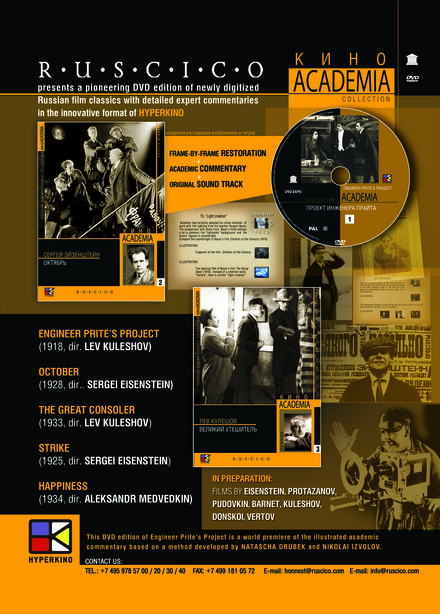Aleksandr Medvedkin (Director) —“Счастье / Happiness” 5th DVD of RUSCICO Academia Series. (DVD Review)
Happiness, Directed by Alexander Medvedkin, 1934, 95 minutes, 1.37:1 Aspect Ratio. Moskombinat, Vostokfilm Mosfil’m
Like many cinephiles I became familiar with Alexander Medvedkin’s work through Chris Marker’s wonderful documentary, The Last Bolshevik, that featured a tender portrait of the topsy-turvy Soviet director. I emphasize “Soviet” as I was continuously astounded as to how Medvedkin got away with his earnestly over-determined socialist sketches that equated Soviet modernity with naïve folk culture. Some of the images from Medvedkin’s 1935 film Happiness really stood out in Marker’s essay with their striking iconography and ridiculous approach to socialist realism. The film style borrows heavily from slapstick, farce and surrealism but in a highly original combination. Medvedkin was an ambivalent character and appeared to enjoy an absurd sense of humour at a time when few people were making jokes. This stylised folk tale is a witty satire on the Soviet system and perhaps the earliest example of Soviet postmodernism.
Happiness was released on DVD by RUSCICO as part of an Academic series that features both Soviet silent and early sound films. This edition makes use of an innovative form of cinematic hypertext, the Hyperkino feature, which mixes the director’s remarks and scholarly footnotes. The notes appear as numbers on the top right providingconsiderable commentary and illustrations for selected scenes, or background to various characters and inter-titles. Films like Happiness operate on multiple levels, and these scholarly notes provide great insight to the background,production and context of the film. I suspect they would be invaluable to students of the period. The Hyperkino system was developed by Nikolai Izvolov and Natascha Drubek-Meyer, and is best experienced on a computer where the viewer can really take advantage of the interactive options on the disk and read the notes with greater ease. The well-designed package thoughtfully includes two region-free disks: Disk One features the film with the Hyperkino commentary in Russian and English and Disk Two which includes the film with a choice of subtitles (English, French, German, Spanish, Italian and Portuguese). Furthermore, the high transfer and image quality of the DVDs is impressive.
Happiness is a quirky, philosophical comedy in both form and content. Its characters, themes and style originate from Russian folklore but the film is charged with a risqué, modern humour that crafts a funny yet bleak portrait of peasants in the 1930s. It is a tale about a poor, hapless and lazy peasant called Khmyr who is sent out by his wife, Anna, to find happiness. As in a typical Russian folktale he expects it to fall upon him from the sky as a miracle rather than through hard work. Khmyr and his wife are dirt poor, and in Russian folklore, the poorer the peasants the more they were apt to believe in miraculous salvation. One form of happiness resides right next door where a neighbour enjoys an endless amount of pastries as they jump straight out of the frying pan and into his mouth. Khmyr’s idea of happiness is manifest in his dreams of being tsar, eating and doing nothing all day. He needs a miracle, and soon finds one in the form of a merchant’s purse by the side of the road. The money seems to grant him and his wife happiness, but it’s temporary-the tax collectors take all of their newfound. Then a group of thieves attempt to rob Khmyr, but when they discover that he has nothing, they give him money out of pity. Dejected, Khmyr decides to take his own life, however the bureaucrats need workers, and they send soldiers to beat some sense into him. After the beating Khmyr loses all hope for happiness, but his industrious wife, Anna, finds real happiness on a collective farm.
Naturally the satire operates in story-time, and there is an easy transition between the pre-revolutionary past and the Soviet present. This grotesquely funny parody of collective farming was filmed in the style of the Russian folktale in a representational mode. It confused the critics and was banned by the authorities for twenty years after it became apparent that Medvedkin was ridiculing the collectivization policy. With the rising popularity of the talkies Happiness became the last silent film of the Soviet era. Happiness is a rich and complex parable, and the newly released edition by the RUSCICO Academia series offers extensive supplementary notes and background information, which significantly enhances the viewing experience. The context provided affords a greater understanding and appreciation for the film, and the new release brings the work of Medvedkin to a new and broader audience.





